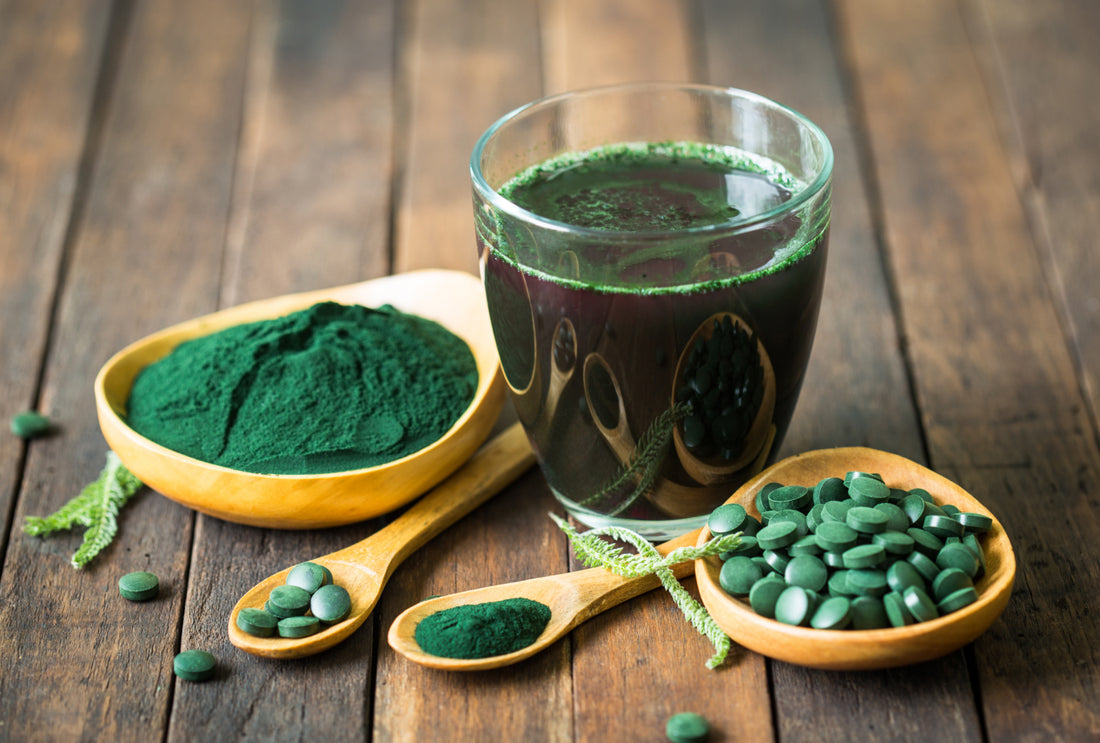A healthy and balanced diet means consuming a healthy combination of vitamins, minerals, and other nutrients in your diet, but it gets a lot easier when you can turn to foods that have a lot of nutrients on their own. Consuming Spirulina algae can be a great way to support your overall health and wellness since this marine food is so nutrient-dense.
However, that doesn’t mean everyone will be eager to include this supplement in their diets. Spirulina can have a polarizing taste; some people enjoy it while others do not.
Is Spirulina the right option for you? Gaining a picture of how Spirulina tastes will give you an idea of whether or not you should include this supplement in your daily routine.
What Is Spirulina Algae?
Spirulina is a type of blue-green algae — a.k.a. a cyanobacteria — found in saltwater and freshwater environments. Spirulina has developed a strong reputation as a powerful source of nutrients, with many vitamins, minerals, and antioxidants. Spirulina provides vitamin B12, copper, vitamin C, iodine, and iron, among other great nutrients.
Spirulina is often considered a superfood because it offers an impressive combination of nutrients. The many nutrients in Spirulina have made it a popular nutritional supplement today.
How Can You Take Spirulina?
Spirulina can be consumed fresh and raw when taken out of the water and strained, but this method is not very common. Spirulina supplements are most often found in powders, tablets, capsules, or even liquid drops. Since Spirulina comes in so many forms, there are many ways that you can choose to include Spirulina into your daily routine.
One of the most popular ways to consume Spirulina is by drinking it. Many people conveniently consume Spirulina by mixing the powder or drops with water. However, adding Spirulina powder to a smoothie is an even more enjoyable way to consume the superfood.
With the powder form of Spirulina, you have many options. You can mix Spirulina into various recipes. For example, you can mix Spirulina into a pesto sauce for a healthy green color and an extra boost of nutrition. However, the supplement is rather heat sensitive, and heating it can affect the nutrient content, so it is better to add Spirulina to a sauce, soup, or even oatmeal after the meal is already cooked.
Of course, how you choose to add Spirulina to your diet will depend largely on how much you enjoy the taste of this form of algae and whether you want to find a way to hide it.
What Are the Benefits of Spirulina?
The many vitamins and minerals provided by Spirulina mean that it can offer many potential health benefits. For example, iodine can promote healthy nerve function, while the antioxidant power can promote healthy cell function.
Some of the other health benefits of this algae are that it may:
- Help support immune health
- Support healthy cognitive function, including memory and motor skills
- Maintain healthy energy levels
The high protein content of Spirulina is also a significant benefit. Spirulina is a protein-dense food that is great for supporting muscle growth and repair.
Spirulina also contains nearly all essential amino acids, meaning that your body is better able to build protein from this superfood. There are many excellent benefits to Spirulina that make it a worthy addition to a healthy and balanced diet.
How Does Spirulina Taste?
People have mixed opinions on whether Spirulina tastes good — Spirulina has a distinct taste that you will certainly notice. Spirulina itself tastes like the sea. The closest comparison for Spirulina is the taste of seaweed.
If you have been to the ocean before, imagine the smell in the air of the ocean water — the taste of Spirulina will be reminiscent of that experience, as it can have a strong and earthy flavor. You may also notice a slight taste of sulfur when consuming this algae.
Others point to Spirulina supplements as having a bitter taste, but a bitter taste may indicate an issue with how the supplement is produced. The taste of Spirulina is also often different depending on whether you are consuming it fresh or in the form of a powder.
To some, the earthy taste is somewhat enjoyable or at least tolerable. However, many prefer to mask the taste of Spirulina — this is why many people take Spirulina in the form of a powder or in a smoothie with other drinks or fruits.
Still, it is pretty difficult to mask the ocean or lake taste that can come with taking Spirulina, as it can be present even in smoothies. However, some may find the right combination of ingredients to mask the taste for them.
Are There Side Effects to Spirulina?
Spirulina is generally recognized as safe to take as a supplement, but as with any supplement, some people may experience a few possible side effects. Some of the potential side effects of Spirulina include nausea, headaches, and difficulty sleeping — however, most people who take the supplement do not experience any side effects.
You can reduce the likelihood of experiencing side effects by sticking to the recommended dosage of a supplement and not overdoing it. If you are interested in trying Spirulina as a supplement to your diet, then be sure to discuss it with your doctor or healthcare professional to see if it is a good idea for you.
Are There Other Options Besides Spirulina?
Spirulina has a lot to offer regarding nutrition and convenience, and few other nutritional supplements can match up. The taste of Spirulina isn’t for everyone, so where can you turn if you want similar benefits without a strong taste?
Fortunately, there is an alternative that provides comparable benefits with even more convenience and much less of a polarizing taste. Like Spirulina, Nannochloropsis algae offers a wide range of benefits for your health and wellness, and you can find it in iwi life’s omega-3 supplements.
At iwi life, we produce our algae-based supplements using a special strain of algae called Nannochloropsis.
Nannochloropsis algae is unique because it’s rich in DHA and EPA omega-3s, but it also contains protein, key vitamins and minerals, and antioxidants — meaning it can offer many benefits similar to those of Spirulina.
With iwi life supplements, you can support your immune health, cognitive function, nervous system, and more — all with two simple softgels each day.
We produce this algae using our detailed production process in the deserts of Texas and New Mexico. The algae is then turned into a convenient, once-a-day softgel, meaning there is no need to mix it into foods or strategize about how to take it.
Because this supplement is produced carefully in a controlled environment in the middle of the desert, you do not have to worry about any contaminants or unpleasant taste that comes with. iwi life supplements feature little, if any, taste or smell.
If you are not a fan of seafood, these supplements offer an excellent way to obtain key nutrients without worrying about an unpleasant seafood-like taste.
Power Your Diet With Algae
Spirulina can be a great supplement to a healthy diet, but not everybody can get past the distinct taste of this blue-green algae. If you are looking for an alternative, or complement, to Spirulina, or simply an easy way to support your wellness, iwi life can help.
An iwi life supplement is a great way to provide you with hard-to-come-by nutrients without a questionable taste. To see all the ways that algae can support your overall health and wellness, explore our complete family of plant-based supplements.
Sources:
5 Health Benefits of Spirulina | Cleveland Clinic
Spirulina Information | Mount Sinai - New York
Spirulina in Clinical Practice: Evidence-Based Human Applications | PMC
Nutritional analysis of Spirulina sp to promote as superfood candidate | IOP
















